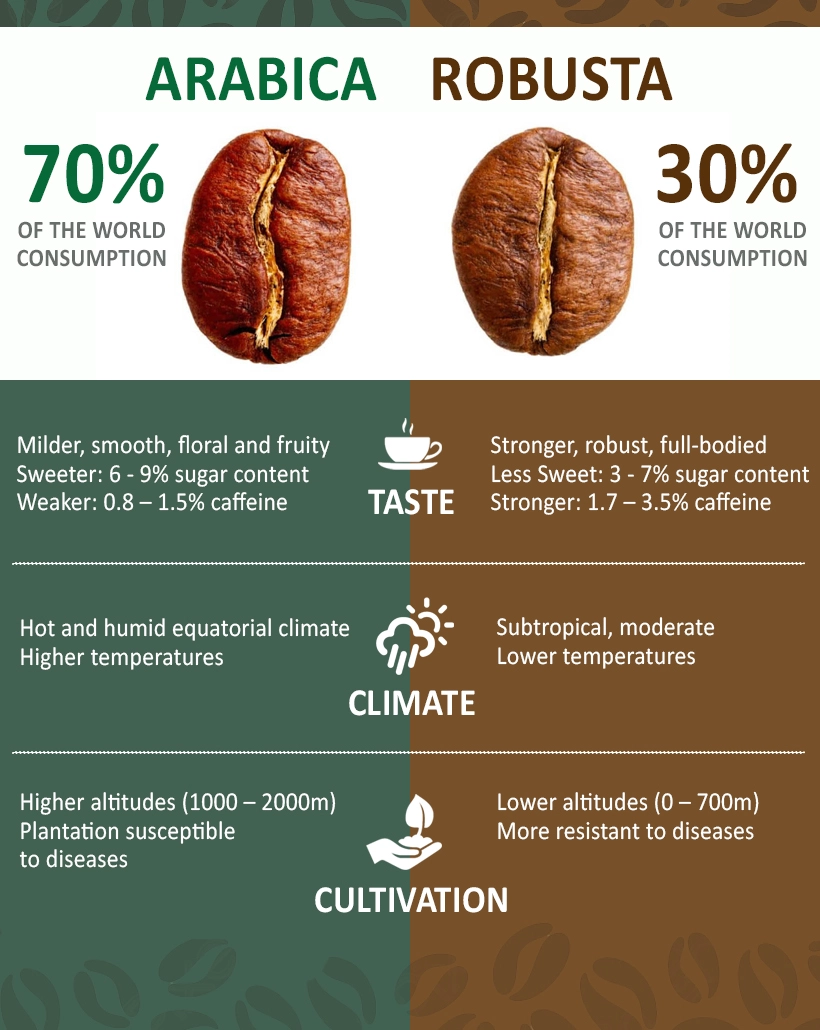As you sip on your morning cup of coffee, have you ever wondered about the beans that went into creating that unique aroma and flavor? Arabica and Robusta are two primary species of coffee beans that dominate the coffee landscape, each offering its own set of characteristics and flavors. In this blog, we delve into the clash of the coffee titans: Arabica coffee beans vs. Robusta coffee beans. Let's explore their differences, similarities, and the impact they have on your favorite brew.

Arabica Coffee Beans:
Arabica (Coffea arabica) reigns supreme as the darling of coffee connoisseurs. These beans are celebrated for their intricate and diverse flavor profiles, ranging from floral and fruity to nutty and chocolatey. Arabica beans are often associated with a smoother, less bitter taste, partly due to their lower caffeine content compared to Robusta beans. The slower maturation process in higher altitudes enhances the flavors and aromas, making Arabica a staple in specialty coffee.
Pros of Arabica Coffee Beans:
- Delicate Flavor: Arabica beans offer a wide range of complex and nuanced flavors, making them a canvas for creative coffee crafting.
- Acidity: Arabica coffee tends to have a brighter and more pleasant acidity, adding vibrancy to the brew.
- Aroma: The aromatic profile of Arabica coffee is often more pronounced and captivating.
- Low Caffeine Content: If you're sensitive to caffeine, Arabica is generally the gentler option.
Cons of Arabica Coffee Beans:
- Price: Arabica beans are more susceptible to diseases and pests, leading to a higher production cost and, consequently, a higher price tag.
- Growing Conditions: Arabica beans are sensitive to environmental changes, requiring specific altitudes, climates, and care.
Robusta Coffee Beans:
Robusta (Coffea canephora) beans are the sturdy, bold sibling of the coffee world. Known for their higher caffeine content and resilience, Robusta beans are often used in espresso blends and instant coffee. While Robusta beans are considered to have a more bitter and earthy taste compared to Arabica beans, they offer their own set of unique characteristics that appeal to certain coffee enthusiasts.
Pros of Robusta Coffee Beans:
- Caffeine Punch: Robusta beans contain roughly twice the amount of caffeine as Arabica beans, delivering a more potent kick.
- Bitterness: The stronger bitterness of Robusta coffee can be desirable for those who enjoy a more robust and intense flavor.
- Crema in Espresso: Robusta's higher oil content leads to a thicker crema in espresso, a delight for many coffee aficionados.
- Resilience: Robusta plants are hardier, resistant to diseases, and can thrive in lower altitudes and less favorable climates.
Cons of Robusta Coffee Beans:
- Flavor: Robusta beans are often criticized for their stronger, bitter taste and lack of complexity compared to Arabica.
- Acidity: Robusta beans generally have lower acidity, which can result in a less vibrant flavor profile.
- Limited Aromatics: The aroma of Robusta coffee is usually less pronounced and captivating than that of Arabica.

The Arabica vs. Robusta debate showcases the diversity that coffee offers. While Arabica beans excel in delicate flavors and captivating aromas, Robusta beans take pride in their caffeine kick and resilience. The choice between these beans ultimately depends on your taste preferences and the kind of coffee experience you're seeking. So, whether you're a fan of the nuanced or the bold, next time you take a sip of your favorite brew, you'll have a deeper appreciation for the beans that make that cup so special.

